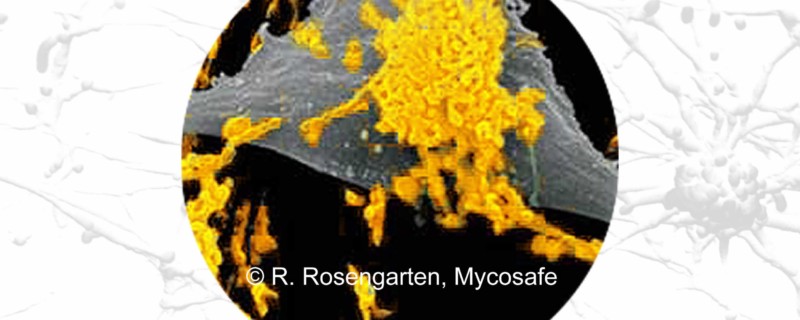
Rapid Real-Time PCR-based Mycoplasma Testing for In-Process Control and Lot Release
Mycoplasma contamination is a major concern in the biopharmaceutical industry. The presence of mycoplasma in cell culture has been described as pervasive. According to the publication” The scope of mycoplasma contamination within the biopharmaceutical industry,“contamination rates in established cell cultures have been reported between 15 and 35% with considerably higher occurrence cited in certain selected populations.”
In this mini-webinar and accompanying article, Martina Sauert, PhD and Carl-Ulrich Zimmerman, PhD of Mycoplasma Biosafety, an independent service provider specialized in the field of mycoplasma testing, discuss the shortcomings of traditional mycoplasma testing methods and the risks associated with mycoplasma contamination in biomanufacturing. They share the manufacturing points where mycoplasma testing is required by regulators and how rapid real-time PCR-basedtesting systems permit in-process mycoplasma testing as part of a quality by design (QbD) approach. Lastly, they introduce their rapid mycoplasma testing system of choice, the Roche CustomBiotech MycoTOOL Real-Time PCR test system, and provide step-by-step advice on product specific validation of a commercially available rapid mycoplasma test.
Mycoplasma
Martina begins the webinar by explaining current mycoplasma testing methods including what is considered the gold standard traditional testing method, the agar and broth culture method described in the European Pharmacopoeia. The agar method offers good sensitivity for cultivatable strains, but takes 28 days to complete and requires the cultivation of live mycoplasma in the quality control area, which presents the risk of inadvertent contamination. She explains that new regulations on the use of nucleic acid amplification techniques as an alternative option for mycoplasma testing have been implemented in the European Pharmacopoeia providing specific nucleic acid amplification technique validation guidelines. Many international regulators accept the use of nucleic acid amplification techniques for mycoplasma testing when properly validated. However, not many marketed products have received approval from regulatory authorities using this type of rapid mycoplasma testing yet.
Martina goes on to describe the effects of mycoplasma on culture. Mycoplasma are small, cell wall-less, parasitic bacteria. In cell culture, mycoplasma depletes the cells of nutrients and can accumulate particular metabolites. In general, mycoplasma can alter basically every characteristic of cell culture including: cellular metabolism, proliferation characteristics, and even cell morphology. They can interfere with virus infections and cytokine expression, thus affecting overall cell behavior.
Mycoplasma Contamination in Biomanufacturing
When the mycoplasma contamination occurs during manufacturing, the losses are most significant with contamination causing decreased product quality, yield, inconsistent results, and adverse effects on patients. Once contamination has been detected, the facility must be decontaminated. The effects of decontamination are significant revenue loss, lost production time, and plant closure.
Martina described where the key mycoplasma testing points are. First raw materials should be tested for mycoplasma prior to being included in culture, especially if they are derived from a material posing a mycoplasma risk. Raw material testing is typically done by the manufacturer of the raw material. Testing during working cell culture offers some early test points that can be very valuable as part of in-process testing. It is recommended that companies also test during seed culture and fermentation as this can detect a contamination early and save time and resources. Testing at final harvest is required by regulatory agencies to show that the product is free of mycoplasma contamination before further downstream process.
Thus the industry ideally requires a rapid and easy test system that is feasible as an early warning system for in-process control, as well as lot release test, replacing the conventional agar and broth method. The testing system should also be sensitive, specific, and robust as required by regulatory agencies, in order to achieve regulatory compliance.
Mycoplasma Testing
Martina described that at Mycoplasma Biosafety, they have experience with various commercially available PCR kits for rapid mycoplasma testing. One commercial kit they leverage for product-specific validation is the Roche CustomBiotech MycoTOOL Mycoplasma Real-Time PCR Test System.
She described that they leverage the MycoTOOL Mycoplasma Real-Time PCR Test System because it has been validated according to EP 2.6.7 Nucleic Acid Amplification Techniques validation guidelines. In contrast to some others, this system can be applied directly, without any prior enrichment steps on CHO-based products. Additionally, the use of the MycoTOOL Mycoplasma Real-Time PCR Test System has recently gained acceptance by FDA for lot-release testing of a CHO-based market product.
The MycoTOOL Mycoplasma Real-Time PCR Test System involves two workflow steps. First, it involves automated DNA-Extraction using the Roche MagNa Pure 96 system. This system allows automated, high-throughput DNA extraction from different kinds of biological samples. The automated extraction is then followed by the MycoTOOL Mycoplasma Real-Time PCR Analysis using the respective Kit and the LightCycler 480 II.
Since this system has been validated to meet the validation requirements in EP 2.6.7 , only a product specific validation is required for implementation as a regulatory testing method.
Dr. Carl-Ulrich Zimmerman then presented information about the test layout of MycoTOOL Mycoplasma Real-Time PCR Test and the crucial check points of the product-specific test validation. He went on to describe the MycoTOOL Test System layout for single samples, what results look like on the LightCycler® 480 II system, and the acceptance criteria.
Strategy for Validation Study
Carl then introduced the multi-step validation concept and presented a sample test layout for sample spiking and testing. He explained how a product-specific validation should follow a multi-step validation concept, meaning that the study is divided up into different parts. Depending on the purpose of the applied test, for example is needed as an early warning system or for product release testing, certain tests are then deemed recommended, optional, or required by the pharmacopoeia.
At Mycoplasma Biosafety, they divide these study parts up into a feasibility study, pre-validation study and the validation study. In the feasibility study it is important to determine the assay performance for the specific product matrix and to test whether the product matrix causes PCR inhibition. At this time a suitable test layout for further studies is selected.
The pre-validation study, part 2, assesses the sensitivity of the system for the product matrix; the objective is to reach a detection of 10 colony forming units in 1 milliliter sample. For this study, a broader selection of mycoplasma strains is chosen, and the selection is based on the origin of the product material and the region where the product should be marketed, for instance Japanese Pharmacopoeia for example requires testing of M. salivarium, which in not required by the European Pharmacopoeia.
The validation study, in the case of release testing, often requires a comparability study, where alternative Real-Time PCR validation is done side-by-side with the culture method and the indicator cell culture method. During validation, the suitability of the test system as mycoplasma testing method is demonstrated, meaning that, the MycoTOOL Real-Time PCR Test System must fulfill the limit of detection requirements defined by the respective regulatory agency requirements for that specific product.
Then Carl showed one example of a result from an actual MycoTOOL Validation Study and talked about what is necessary for proper limit of detection determination.
He added that if the validation cannot be performed in house, there is the possibility to outsource the study and hand it over to a contract testing laboratory. This can be beneficial, as these test labs are not only experienced in the methodologies but they also have the necessary equipment and resources, such as viable mycoplasma reference strains, available. Lastly, if the validation study involves using live mycoplasma, outsourcing the study avoids mycoplasma contamination in-house .
About the Presenters:
 Martina Sauert, PhD, Chief Operations Officer, Mycoplasma Biosafety Services GmbH
Martina Sauert, PhD, Chief Operations Officer, Mycoplasma Biosafety Services GmbH
Martina drives the international business development and public relations, since joining the company in late 2016. She holds a PhD degree in Molecular Microbiology from the University of Vienna, and provides clients, partners, and the interested public with profound background knowledge on mycoplasma detection and the company’s services and products.
 Dr. Carl-Ulrich Zimmerman, Head of Research & Development, Mycoplasma Biosafety Services GmbH
Dr. Carl-Ulrich Zimmerman, Head of Research & Development, Mycoplasma Biosafety Services GmbH
Dr. Zimmerman holds a doctorate in Molecular Biology from the University of Heidelberg. As a postdoctoral scientist at the University of Veterinary Medicine Vienna he dedicated almost 10 years to basic mycoplasma research. He joined the company in 2014 and is the driving force behind all contract research and innovation projects, such as the application of PCR testing methods. He is author of several peer-reviewed publications on mycoplasmas and is also the inventor of one patent application in the area of mycoplasma detection.
About Mycoplasma Biosafety Services GmbH
Mycoplasma Biosafety Services GmbH is a service provider for GMP-compliant testing for mycoplasma contamination in the biopharmaceutical industry. As technological market leader in mycoplasmology, we offer the most comprehensive range of mycoplasma tests by conventional culture methods and new rapid PCR-based assays. We also develop and produce culture media and reference standard products for mycoplasma testing and test validations. The company is committed to fast turnaround testing with absolutely reliable and trustworthy results, excellent mycoplasma expert advisory services and a maximum level of individual client care with the permanent desire to improve its services in interaction with its customers.